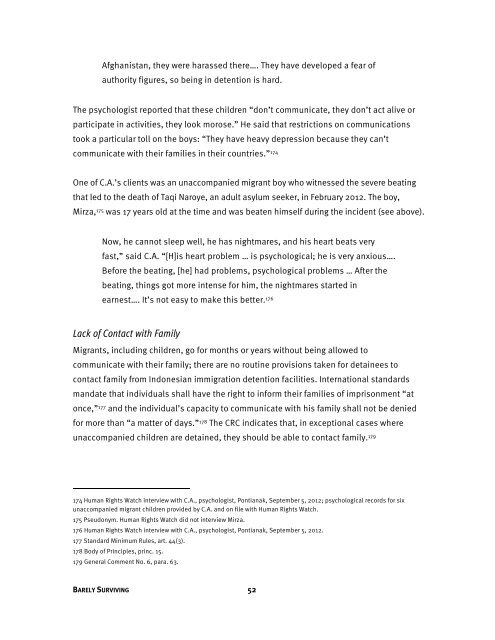Download the full report - Human Rights Watch
Download the full report - Human Rights Watch
Download the full report - Human Rights Watch
Create successful ePaper yourself
Turn your PDF publications into a flip-book with our unique Google optimized e-Paper software.
Afghanistan, <strong>the</strong>y were harassed <strong>the</strong>re…. They have developed a fear of<br />
authority figures, so being in detention is hard.<br />
The psychologist <strong>report</strong>ed that <strong>the</strong>se children “don’t communicate, <strong>the</strong>y don’t act alive or<br />
participate in activities, <strong>the</strong>y look morose.” He said that restrictions on communications<br />
took a particular toll on <strong>the</strong> boys: “They have heavy depression because <strong>the</strong>y can’t<br />
communicate with <strong>the</strong>ir families in <strong>the</strong>ir countries.” 174<br />
One of C.A.’s clients was an unaccompanied migrant boy who witnessed <strong>the</strong> severe beating<br />
that led to <strong>the</strong> death of Taqi Naroye, an adult asylum seeker, in February 2012. The boy,<br />
Mirza, 175 was 17 years old at <strong>the</strong> time and was beaten himself during <strong>the</strong> incident (see above).<br />
Now, he cannot sleep well, he has nightmares, and his heart beats very<br />
fast,” said C.A. “[H]is heart problem … is psychological; he is very anxious….<br />
Before <strong>the</strong> beating, [he] had problems, psychological problems … After <strong>the</strong><br />
beating, things got more intense for him, <strong>the</strong> nightmares started in<br />
earnest…. It’s not easy to make this better. 176<br />
Lack of Contact with Family<br />
Migrants, including children, go for months or years without being allowed to<br />
communicate with <strong>the</strong>ir family; <strong>the</strong>re are no routine provisions taken for detainees to<br />
contact family from Indonesian immigration detention facilities. International standards<br />
mandate that individuals shall have <strong>the</strong> right to inform <strong>the</strong>ir families of imprisonment “at<br />
once,” 177 and <strong>the</strong> individual’s capacity to communicate with his family shall not be denied<br />
for more than “a matter of days.” 178 The CRC indicates that, in exceptional cases where<br />
unaccompanied children are detained, <strong>the</strong>y should be able to contact family. 179<br />
174 <strong>Human</strong> <strong>Rights</strong> <strong>Watch</strong> interview with C.A., psychologist, Pontianak, September 5, 2012; psychological records for six<br />
unaccompanied migrant children provided by C.A. and on file with <strong>Human</strong> <strong>Rights</strong> <strong>Watch</strong>.<br />
175 Pseudonym. <strong>Human</strong> <strong>Rights</strong> <strong>Watch</strong> did not interview Mirza.<br />
176 <strong>Human</strong> <strong>Rights</strong> <strong>Watch</strong> interview with C.A., psychologist, Pontianak, September 5, 2012.<br />
177 Standard Minimum Rules, art. 44(3).<br />
178 Body of Principles, princ. 15.<br />
179 General Comment No. 6, para. 63.<br />
BARELY SURVIVING 52
















